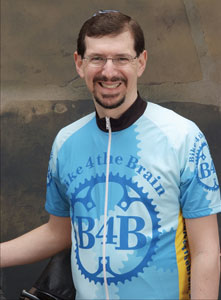 Ken Sonnenschein, M.D., found a way to merge his passion for cycling with his compassion for the mentally ill.
Ken Sonnenschein, M.D., found a way to merge his passion for cycling with his compassion for the mentally ill.
Dr. Sonnenschein, a children and adolescent psychiatrist with Kansas City Psychiatric Group who attends Congregation Beth Shalom, started Bike for the Brain six years ago. The annual bike race raises funds for organizations that provide services for mental health patients and promotes awareness about these illnesses. This year’s event starts at 8 a.m. Sept. 5 at Johnson County Mental Health Center, 6000 Lamar Ave. in Mission, Kan.
“There are many different types of runs and walks for many different things,” Dr. Sonnenschein said. “As I was going around and participating in many of these runs, walks and rides I was wondering, ‘where is the mental health event?’ ”
Dr. Sonnenschein has been an active cyclist for 15 years. He said he decided to create a race to benefit the patients he serves.
“The reason we call it Bike for the Brain is because we know that these mental health disorders are brain-based disorders,” Dr. Sonnenschein said.
Because mental illness can affect a patient’s emotional state and behavioral habits, Sonnenschein said some people forget that the disorders stem from the brain. He said some people still have the attitude that, “these aren’t real illnesses.”
Sonnenschein said many patients also suffer from an internal stigma that makes it difficult to seek treatment.
“We all want to be well and when we are not well we are slow to acknowledge that,” Dr. Sonnenschein said. “That is even more true when we are experiencing some type of emotional or behavioral change.”
Some patients feel too embarrassed or ashamed to let others know that they have a chronic mental illness such as bipolar disorder or generalized anxiety disorder, Dr. Sonnenschein said.
“There is a shame factor that interestingly doesn’t exist with other types of illnesses,” Dr. Sonnenschein said.
Last year 420 people attended Bike for the Brain. This year’s event will include a variety of routes that range from 3 miles to 75 miles. The 75-mile route will take participants past some of the events’ beneficiaries and other mental health resources in the area.
The bike race starts at 8 a.m. A non-competitive 5K run will also start at 8 a.m. for non-bicycle riders who want to participate.
This year’s Bike for the Brain will also include the annual Tricycle Challenge. Adults who donate $100 will race against one another on child-sized tricycles. Children will be able to race the tricycle course at 11 a.m.
Dr. Sonnenschein said the tricycle contest proves to be a hit year after year.
Sharon Lawrenz, executive director of Pathway to Hope, promotes Bike for the Brain every year. For the past two years Pathway to Hope has received funds from Bike for the Brain. The organization provides services to people in treatment for mental illnesses. Pathway to Hope owns a house called the Blake House, which provides transitional housing for patients who receive treatment at the Johnson County Mental Health Department.
“It houses up to six people who are doing relatively well in their recovery,” Lawrenz said. “Last year we got enough money (from Bike for the Brain) to get new appliances for the kitchen and a washer and a dryer.”
Lawrenz said Bike for the Brain’s impact extends beyond financial. She said that when people with mental illness are able to see other successful people with mental illness and the family members and community members who support them it helps break the stigma.
“Really the majority of people with mental illness are doing really well,” Lawrenz said.
Suicide Awareness Survivor Support of Missouri and Kansas is another recipient of Bike for the Brain Funds.
Bonnie Swade, co-founder of the group, lost her son to suicide. She said events like Bike for the Brain are important to the community.
Swade’s survivor group plans to host a remembrance walk on Sept. 11 at Loose Park, 51st Street and Wornall Road, Kansas City, Mo.
While the survivors walk is intended to be a solemn event Dr. Sonnenschein said people can bring their entire family to Bike for the Brain. He said he considers the Bike for the Brain a therapeutic event.
“Exercise is good for us and being with other people is good for us,” Dr. Sonnenschein said.
Along with cycling and mental health, Dr. Sonnenschein lists gardening as one of his passions. He co-chairs the Mitzvah Garden. Volunteers plant fruits, vegetables and flowers in the garden and donate the harvest to those in need.
Dr. Sonnenschein said these three passions intertwine with his faith.
“We all have an obligation to repair our broken world,” Dr. Sonnenschein said. “One of the things that we have been encouraging is the wellness challenge.”
Dr. Sonnenschein said the components of the Bike for the Brain wellness challenge include: exercise, fun, socialization, spiritual development, healthy diet and charitable giving. People can accomplish several of those components by attending this year’s Bike for the Brain event. For more information, visit www.bikeforthebrain.org.


